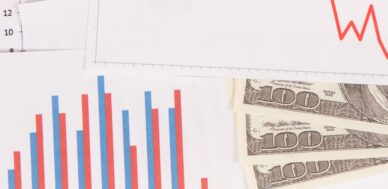Indices at All-Time Highs, Odds of Stock Market Crash Increasing
Key stock indices currently sit at or near their record highs. The Dow Jones Industrial Average is near the 40,000-point level. The S&P 500 looks like it can’t be stopped. The Nasdaq Composite Index has been soaring.
However, don’t get complacent: the odds of a stock market crash could be increasing.
At the moment, the Chicago Board Options Exchange (CBOE) Volatility Index (VIX), often referred to as the “fear index,” says investors are anything but fearful.
The American Association of Individual Investors (AAII) Investor Sentiment Survey, a weekly survey that asks investors about their take on the stock market, says the number of bullish investors has been growing.
The National Association of Active Investment Managers (NAAIM) Exposure Index says active investment managers don’t see much risk in owning stocks, and that a stock market crash may not be a scenario in their playbook.
Utilities Stocks Say Investors Preparing for Stock Market Crash?
Here’s the thing: while all this happens, some factions of the financial world suggest that a stock market crash could be coming—and that some investors could be bracing for impact.
For some perspective, take a look at the chart below. It plots the performance of the Utilities Select Sector SPDR Fund (NYSEARCA:XLU), an exchange-traded fund (ETF) that holds utilities stocks, and compares it to the performance of the S&P 500.
Chart courtesy of StockCharts.com
Notice something interesting here?
Utilities stocks have been flying. In fact, year-to-date, utilities stocks have been beating the S&P 500 by a decent margin.
Here’s the concerning part: investors tend to rush to utilities stocks when they see a risk of a sell-off in the overall stock market and/or uneven economic conditions. That’s because utilities are regulated, they tend to have consistent growth, they provide dividends, and so on. Utilities stocks are usually considered the least speculative stocks.
With utilities stocks beating the overall stock market, one has to ask: Is a stock market crash nearing?
At All-Time Highs, Stocks’ Fundamentals Get Frothy
Talking about a possible stock market crash when indices are at all-time highs might sound a little naïve and even comical. But what’s scary to me is that not many people are talking about it. There’s a lot of complacency out there.
Here’s what I’ve learned over years of following the stock market: at all-time highs, fundamentals are frothier (share prices are higher than the stocks’ intrinsic values), there’s a lot of capital misallocation, and there’s a lot more “this time it’s different” sentiment.
I’ve also learned that irrationality can go on for a long time. So, it’s possible that stock indices will surge and a melt-up will follow this summer. But eventually, fundamentals matter—and when they do, it’s usually not a pretty sight. We could end up seeing a fierce sell-off .
How Low Could the Stock Market Go?
Dear reader, take a look at the S&P 500 chart below and pay close attention to the blue line. It’s the index’s 50-month moving average (MA).
Since 2011, the S&P 500’s 50-month MA has acted as a gravitational force for the index. The S&P 500 tends to come back to that level over and over again.
Chart courtesy of StockCharts.com
If the S&P 500 goes back and tests its 50-month MA, we could be looking at a decline of more than 20%. Keep in mind, however, that the overall trend for the stock market continues to point upward.
If the S&P 500’s 50-month MA doesn’t hold, we could really get into a big stock market crash scenario because the next support level for the S&P 500 isn’t until its 2022 low, which is about 35% below its current level. Below that, the next support level isn’t until its 2020 low, which is about 55% below its current level.
I’ll end with this: don’t get complacent, be selective, and allocate your investment dollars wisely.
